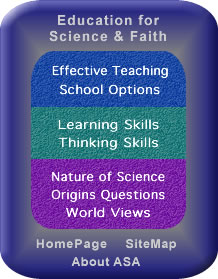Relativism & Postmodernism
Tolerance & Truth
in Relativism
In two short essays, Josh
McDowell and Bob Hostetler describe appropriate responses, motivated
by love, to the two meanings (old and new, with critical thinking and
with relativism) of
tolerance: 1 2 .
Douglas Groothuis summarizes
principles for
Thinking
Straight about Tolerance.
Reality
101 by Craig Rusbult,
is about things that should be obvious, like the difference between
truth and
truth-claims — illustrated by asking "in
reality did
the sun and planets revolve
around the earth in 1500, simply because people believed this
was the reality?" — and
between reality that is
constructed by humans or is
independent
of humans.
Logical
Evaluative Thinking
The value of Logical
Evaluation in Critical
Thinking — which includes Critical
Thinking in a Christian Worldview — is challenged by postmodernism.
Postmodernism
Skeptical questions about
evidence and reason have inspired the
postmodernist perspective,
based on relativism.
introductions: a
brief outline of
Apologetics
on the Postmodern Campus; and
Understanding
Today's Postmodern University by Jim Leffel.
Xenos Fellowship
provides a structured summary of five major worldviews:
naturalism,
pantheism, theism, spiritism & polytheism, and postmodernism.
Following
an introduction to worldviews and their evaluation, Rick
Wade describes
deism,
nihilism, existentialism, and postmodernism. He
says,
"Postmodernism
isn't really a philosophy,... it's more a condition or mood,... a reaction
against Enlightenment rationalism," against
modernism. Basically,
postmodernism is a worldview that criticizes the value of rational
evaluation based on logic.
Mike Metzger explains how
to talk with those who are influenced by postmodernism (and that's
most of us!) in a way they can understand, with
Open
Forums for Reaching Postmoderns: Coming Alongside Our Friends in the
Journey. In this series of pages, he
"leads
the reader through the basic worldview of postmoderns, the common ground
they share with
biblical Christians,
and
how
to use it effectively to bring them closer to a saving knowledge and
faith in Christ."
Wesley Hurd
outlines the
essentials
of postmodernism, while Brian Walsh & Richard Middleton (authors
of a book about pomo) ask
Is
it postmodern or hypermodern? (in
wb-archive) Mary Klages describes "
a
complicated set of ideas" in a wide range of fields, including
literature and art, and Don Closson explains appropriate
Christian
responses.
Relativism
in Religion
As an observer of the
1993 Parliament of World Religions, Elliot Miller reports on spiritual
relativism in
"the
new tolerance" in religion and asks,
Should
Christians participate in interfaith communion?
Relativism
in Science?
Is the relativism
of postmodernism supported by
Einstein's
Theory of Relativity? (no because it's about science not philosophy, and it should be
called a Theory of Invariance, anyway)
And in another area
of modern physics, 5 pages about the
Philosophy
of Quantum Mechanics explain why quantum science does not provide support for the wild
speculations, by some New Age apologists, about "mind creating
reality."
Modernism
& Naturalistic
Scholarship
Eventually this website will
look at critical attacks on the Bible (and traditional Christianity) — as in the Jesus
Seminar — that claim
to be based on the naturalistic methods of modern science.
Currently you can read about the shoddy
scholarship (and ethics) of "postmodern fiction" in Historical Accuracy and The
Da Vinci
Code.
Other
Worldviews
Eventually, other worldviews (not just postmodernism) will
be examined. Currently
there is a page about New Age Worldviews and other
worldview descriptions will be added later.

